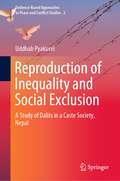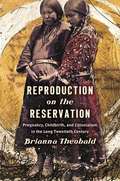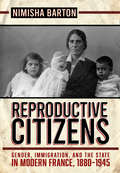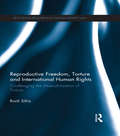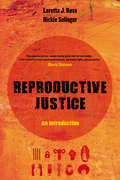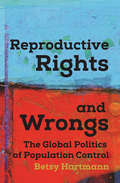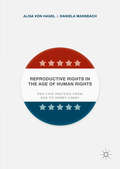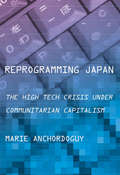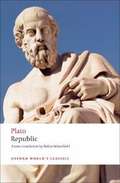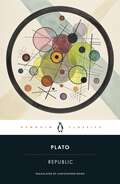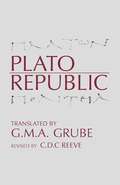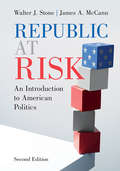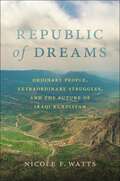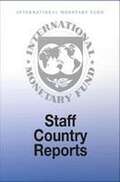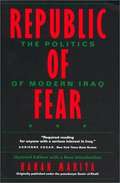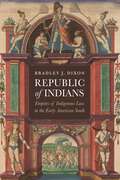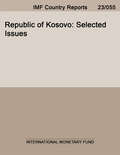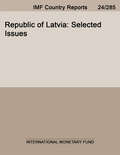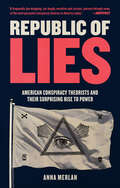- Table View
- List View
Reproduction of Inequality and Social Exclusion: A Study of Dalits in a Caste Society, Nepal (Evidence-Based Approaches to Peace and Conflict Studies #2)
by Uddhab PyakurelThis book is a detailed account of how hierarchy has been maintained historically by the Nepali state, affirming the uniqueness of a caste-based social order by bringing outsiders, especially ethnic groups and religious minorities, into the caste fold. Focusing on the contemporary state of Dalits, the community that was and is put at the bottom of a very hierarchical social order in Nepal, the author argues that the traditional caste-based social order is still prevalent in the “new” Nepal even after the recent socio-political and constitutional changes. Illustrated by scientifically employed and interpreted data mainly in the three sectors of education, politics and employment, the book postulates that people who were and are born into the “high caste” still have more access to the resources and opportunities available in society in comparison with those born into the “lower” caste. It further argues that although reservation policies are in place to address social exclusion, these could not bring expected outcomes mainly due to the lack of engagement, if not ignorance, of both dominant groups and the community in the margin. The absence of clarity among political actors on the positive discrimination and affirmative actions has contributed to backtracking the recently created space in line with “inclusive Nepal”.
Reproduction on the Reservation: Pregnancy, Childbirth, and Colonialism in the Long Twentieth Century (Critical Indigeneities Ser.)
by Brianna TheobaldThis book documents the transformation of reproductive practices and politics on Indian reservations from the late nineteenth century to the present, integrating a localized history of childbearing, motherhood, and activism on the Crow Reservation in Montana with an analysis of trends affecting Indigenous women more broadly. As the author illustrates, the federal government and local authorities have long sought to control Indigenous families and women's reproduction, using tactics such as coercive sterilization and removal of Indigenous children into the white foster care system. But she examines women's resistance, showing how they have worked within families, tribal networks, and activist groups to confront these issues. Blending local and intimate family histories with the histories of national movements such as WARN (Women of All Red Nations), the author links the federal government's intrusion into Indigenous women's reproductive and familial decisions to the wider history of eugenics and the reproductive rights movement. She argues convincingly that colonial politics have always been--and remain--reproductive politics. By looking deeply at one tribal nation over more than a century, the author offers an especially rich analysis of how Indigenous women experienced pregnancy and motherhood under evolving federal Indian policy. At the heart of this history are the Crow women who displayed creativity and fortitude in struggling for reproductive self-determination.
Reproductive Citizens: Gender, Immigration, and the State in Modern France, 1880–1945
by Nimisha BartonIn the familiar tale of mass migration to France from 1880 onward, we know very little about the hundreds of thousands of women who formed a critical part of those migration waves. In Reproductive Citizens, Nimisha Barton argues that their relative absence in the historical record hints at a larger and more problematic oversight—the role of sex and gender in shaping the experiences of migrants to France before the Second World War. Barton's compelling history of social citizenship demonstrates how, through the routine application of social policies, state and social actors worked separately toward a shared goal: repopulating France with immigrant families. Filled with voices gleaned from census reports, municipal statistics, naturalization dossiers, court cases, police files, and social worker registers, Reproductive Citizens shows how France welcomed foreign-born men and women—mobilizing naturalization, family law, social policy, and welfare assistance to ensure they would procreate, bearing French-assimilated children. Immigrants often embraced these policies because they, too, stood to gain from pensions, family allowances, unemployment benefits, and French nationality. By striking this bargain, they were also guaranteed safety and stability on a tumultuous continent.Barton concludes that, in return for generous social provisions and refuge in dark times, immigrants joined the French nation through marriage and reproduction, breadwinning and child-rearing—in short, through families and family-making—which made them more French than even formal citizenship status could.
Reproductive Freedom, Torture and International Human Rights: Challenging the Masculinisation of Torture (Routledge Research in Human Rights Law)
by Ronli SifrisThis book contributes to a feminist understanding of international human rights by examining restrictions on reproductive freedom through the lens of the right to be free from torture and other cruel, inhuman or degrading treatment. Ronli Sifris challenges the view that torture only takes place within the traditional paradigm of interrogation, punishment or intimidation of a detainee, arguing that this traditional construction of the concept of torture prioritises the experiences of men over the experiences of women given that the pain and suffering from which women disproportionately suffer frequently occurs outside of this context. She does this by conceptualising restrictions on women’s reproductive freedom within the framework of the right to be free from torture. The book considers the gendered nature of international law and the gender dimensions of the right to be free from torture. It examines the extension of the prohibition of torture to encompass situations beyond the traditional detainee context in recent years to encompass situations such as rape and female genital mutilation. It goes on to explore in detail whether denying access to abortion and involuntary sterilization constitutes torture or other cruel, inhuman or degrading treatment under international law. The book looks at whether limitations on reproductive freedom meet the determining criteria of torture which are: severe pain or suffering; being intentionally inflicted; being based on discrimination; linked in some way to a State official; whether they constitute lawful sanctions; and the importance of the concept of powerlessness. In doing so the book also highlights how this right may be applicable to other gender-based abuses including female genital mutilation, and how this right may be universally applied to allow women worldwide the right to reproductive freedom.
Reproductive Health and Maternal Sacrifice
by Pam LoweThis book demonstrates that the symbol of maternal sacrifice is the notion that 'proper' women put the welfare of children, whether born, in utero or not conceived, over and above any choices and desires of their own. The idea of maternal sacrifice acts as powerful signifier in judging women's behaviour that goes beyond necessary care for any children. The book traces its presence in various aspects of reproductive health, from contraception to breastfeeding. Pam Lowe shows how although nominally choices are presented to women around reproductive health, maternal sacrifice is used to discipline women into conforming to specific norms, reasserting traditional forms of womanhood. This has significant implications for women's autonomy. Women can resist or reject this disciplinary position when making reproductive decisions, but in doing so, they may be positioned as transgressing and/or need to justify their decisions. The book will be of great interest to scholars of sociology, gender studies and health studies.
Reproductive Justice: An Introduction (Reproductive Justice: A New Vision for the 21st Century #1)
by Rickie Solinger Loretta J. RossReproductive Justice is a first-of-its-kind primer that provides a comprehensive yet succinct description of the field. Written by two legendary scholar-activists, Reproductive Justice introduces students to an intersectional analysis of race, class, and gender politics. Clearly showing how reproductive justice is a political movement of reproductive rights and social justice, the authors illuminate how, for example, a low-income, physically disabled woman living in West Texas with no viable public transportation, healthcare clinic, or living-wage employment opportunities faces a complex web of structural obstacles as she contemplates her sexual and reproductive intentions. Putting the lives and lived experience of women of color at the center of the book and using a human rights analysis, Loretta J. Ross and Rickie Solinger show how the discussion around reproductive justice differs significantly from the pro-choice/anti-abortion debates that have long dominated the headlines and mainstream political conflict. In a period in which women's reproductive lives are imperiled, Reproductive Justice provides an essential guide to understanding and mobilizing around women's human rights in the twenty-first century. Reproductive Justice: A New Vision for the Twenty-First Century publishes works that explore the contours and content of reproductive justice. The series will include primers intended for students and those new to reproductive justice as well as books of original research that will further knowledge and impact society. Learn more at www. ucpress. edu/go/reproductivejustice.
Reproductive Rights and Wrongs: The Global Politics of Population Control (Third Edition) (Women's Studies)
by Betsy HartmannWith a new prologue by the author, this feminist classic is an important gateway into the controversial topic of population for students, activists, researchers and policymakers. It challenges the myth of overpopulation, uncovering the deeper roots of poverty, environmental degradation and gender inequalities. With vivid case studies, it explores how population control programs came to be promoted by powerful governments, foundations and international agencies as an instrument of Cold War development and security policy. Mainly targeting poor women, these programs were designed to drive down birth rates as rapidly and cheaply as possible, with coercion often a matter of course. In the war on population growth, birth control was deployed as a weapon, rather than as a tool of reproductive choice. <p><p> Threaded throughout Reproductive Rights and Wrongs is the story of how international women’s health activists fought to reform population control and promote a new agenda of sexual and reproductive health and rights for all people. While their efforts bore fruit, many obstacles remain. On one side is the anti-choice movement that wants to deny women access not only to abortion, but to most methods of contraception. On the other is a resurgent, well-funded population control lobby that often obscures its motives with the language of women’s empowerment. Despite declining birth rates worldwide - average global family size is now 2.5 children - overpopulation alarm is on the rise, tied now to the threats of climate change and terrorism. <p> Reproductive Rights and Wrongs helps readers understand how these contemporary developments are rooted in the longer history and politics of population control. In the pages of this book a new generation of readers will find knowledge, argumentation and inspiration that will help in ongoing struggles to achieve reproductive rights and social, environmental and gender justice.
Reproductive Rights in the Age of Human Rights
by Alisa Von Hagel Daniela MansbachThis book traces the development of the discourse used by the pro-life movement since the 1970s, and its relationship to public policy efforts at the state and federal level. The pro-life movement's successes, both in legislative efforts to limit access to abortion as well changing the public's perception of the pro-life movement, is surprising given American's continued support of some level of access to abortion. Using a multi-method approach, the authors argue that these successes are a result of a dynamic and responsive movement, which has adapted both its discourse and public policy efforts since Roe v. Wade. With the Hobby Lobby ruling in 2014, the movement has successfully created its newest strategy, integrating claims of religious liberty to protect individuals and corporate entities. The book's examination of the pro-life strategy highlights its current and future impact on human rights, reproductive rights, and right-wing politics.
Reprogramming Japan: The High Tech Crisis under Communitarian Capitalism
by Marie AnchordoguyHow have state policies influenced the development of Japan's telecommunications, computer hardware, computer software, and semiconductor industries and their stagnation since the 1990s? Marie Anchordoguy's book examines how the performance of these industries and the economy as a whole are affected by the socially embedded nature of Japan's capitalist system, which she calls "communitarian capitalism." Reprogramming Japan shows how the institutions and policies that emerged during and after World War II to maintain communitarian norms, such as the lifetime employment system, seniority-based wages, enterprise unions, a centralized credit-based financial system, industrial groups, the main bank corporate governance system, and industrial policies, helped promote high tech industries. When conditions shifted in the 1980s and 1990s, these institutions and policies did not suit the new environment, in which technological change was rapid and unpredictable and foreign products could no longer be legally reverse-engineered. Despite economic stagnation, leaders were slow to change because of deep social commitments. Once the crisis became acute, the bureaucracy and corporate leaders started to contest and modify key institutions and practices. Rather than change at different times according to their specific economic interests, Japanese firms and the state have made similar slow, incremental changes.
Republic
by PlatoRepublic is the central work of the Western world's most famous philosopher. Essentially an inquiry into morality, Republic also contains crucial arguments and insights into many other areas of philosophy. It is also a literary masterpiece: the philosophy is presented for the most part for the ordinary reader, who is carried along by the wit and intensity of the dialogue and by Plato's unforgettable images of the human condition. This new, lucid translation by Robin Waterfield is complemented by full explanatory notes and an up-to-date critical introduction.
Republic
by PlatoAn authoritative new translation of Plato's The Republic by Christopher Rowe, with notes and an introduction.'We set about founding the best city we could, because we could be confident that if it was good we would find justice in it' The Republic, Plato's masterwork, was first enjoyed 2,400 years ago and remains one of the most widely-read books in the world: as a foundational work of Western philosophy, and for the richness of its ideas and virtuosity of its writing. Presented as a dialogue between Plato's teacher Socrates and various interlocutors, it is an exhortation to philosophy, inviting its readers to reflect on the choices to be made if we are to live the best life available to us. This complex, dynamic work creates a picture of an ideal society governed not by the desire for money, power or fame, but by philosophy, wisdom and justice.Christopher Rowe's accurate and enjoyable new translation remains faithful to the many variations of the Republic's tone, style and pace. This edition also contains a chronology, further reading, an outline of the work's main arguments and an introduction discussing Plato's relationship with Socrates, and the Republic's style, ideas and historical context.
Republic (Hackett Classics)
by PlatoThe revised edition of Grube's classic translation follows and furthers Grube's noted success in combining fidelity to Plato’s text with natural readability, while reflecting the fruits of new scholarship and insights into Plato's thought since publication of the first edition in 1974. A new introduction, index, and bibliography by Professor Reeve are included in this new rendering.
Republic at Risk: An Introduction to American Politics
by Walter J. Stone James A. McCannWhen people have the freedom to further their own personal interests in politics, the results may be disastrous. Chaos? Tyranny? Can a political system be set up to avoid these pitfalls, while still granting citizens and politicians the freedom to pursue their interests? Republic at Risk is a concise and engaging introduction to American politics. The guiding theme is the problem of self-interest in politics, which James Madison took as his starting point in his defense of representative government in Federalist 10 and 51. Madison believed that unchecked self-interest in politics was a risk to a well-ordered and free society. But he also held that political institutions could be designed to harness self-interest for the greater good. Putting Madison's theory to the test, the authors examine modern challenges to the integrity and effectiveness of US policy-making institutions, inviting readers to determine how best to respond to these risks.
Republic of Belarus: 2001 Article IV Consultation--Staff Report; Public Information Notice on the Executive Board Discussion; and Statement by the Executive Director for the Republic of Belarus
by International Monetary FundA report from the International Monetary Fund.
Republic of Congo: Selected Issues and Statistical Appendix
by International Monetary FundA report from the International Monetary Fund.
Republic of Dreams: Ordinary People, Extraordinary Struggles, and the Future of Iraqi Kurdistan
by Nicole F. WattsA harrowing political history of Kurdish Iraq told through the extraordinary rags-to-riches story of a childhood refugeeIn the Iran-Iraq war of the 1980s, Iraqi president Saddam Hussein used chemical weapons against his own people, the Iraqi Kurds. Five thousand people died in what became known as the Halabja Massacre, which has been deemed the worst chemical attack in history. Nicole F. Watts, a former journalist and now professor of political science, has spent over a decade researching the struggles of the Kurdish people in Iraq, and in vivid, lyrical prose, she tells their story through the eyes of Peshawa, a young Muslim Kurd whose family barely survived the bombing and then fled for their lives.Republic of Dreams is a harrowing portrait of Iraqi Kurdistan and its history, as it weathers Hussein’s genocidal campaign against the Kurds, a civil war, the US invasion of Iraq, the Arab Spring, and the sustained neglect of the city of Halabja. Throughout the book, the thread of Peshawa’s story immerses readers in the everyday and extraordinary world of Iraqi Kurds between the late 1980s and 2022, exploring the meaning of home and dislocation in the wake of war and genocide.Based on over a hundred in-depth interviews with Iraqi Kurdish activists, journalists, elected officials, and community organizers, and hundreds of hours of conversations with Peshawa and his family, Republic of Dreams brings to vivid life the story of modern Kurdistan, and the Kurdish national dream to have their own homeland.
Republic of Equatorial Guinea: Statistical Appendix
by International Monetary FundA report from the International Monetary Fund.
Republic of Fear: The Politics for Iraq (Updated Edition)
by Kanan MakiyaThis book is not a history of the Ba'th regime established in 1968 in Iraq. It is an enquiry into its meaning.
Republic of Indians: Empires of Indigenous Law in the Early American South (Early American Studies)
by Bradley J. DixonA sweeping history of the Native Southerners who wrote their principles into Spanish and English lawA sweeping history of the Native Southerners who challenged European empires from the inside, Republic of Indians tells the story of Indigenous leaders who wrote their principles into Spanish and English law.While in the Spanish Empire, Natives were a recognized part of “la república de indios,” the “republic of Indians,” other Natives across the early American South understood themselves to be joined with European colonists in larger polities, each jealously guarding their own bodies of liberties under royal sanction. Thus, rather than simply rejecting European pretensions to rule them as subjects and vassals, Native Southerners as diverse as the Apalachees, Pamunkeys, Powhatans, and Timucuas redefined their status to become political players in legislative assemblies and the courts of distant monarchs. They pushed for incorporation in larger political systems in which they had a say and were themselves instrumental in creating.Adapting pre-invasion practices to the technology of writing and the challenges of colonialism, Indigenous petitioners sought exemptions from labor and protection for “the lands that God gave to them,” as well as the right to install preferred leaders, avoid enslavement, ally with the Crown against colonists, ease harsh colonial laws, and even amend the terms of treaties and compacts. Bradley J. Dixon shows how their petitions also stand as enduring contributions to American political thought and how it was these “vassals” and “subjects” who gave meaning to the modern idea of tribal sovereignty. In the South, the Spanish and English empires came to resemble one another precisely because they were both dependent to a remarkable degree on maintaining Indigenous political consent and were founded in large part on Indigenous conceptions of law.
Republic of Kosovo: Selected Issues Paper (Imf Staff Country Reports #No. 13/223)
by International Monetary Fund. European Dept.A report from the International Monetary Fund.
Republic of Latvia: Report on the Observance of Standards and Codes--Data Module, Response by the Authorities, and Detailed Assessments Using Data Quality Assessment Framework
by International Monetary FundA report from the International Monetary Fund.
Republic of Latvia: Selected Issues
by International Monetary FundA report from the International Monetary Fund.
Republic of Latvia: Selected Issues (Imf Staff Country Reports #Country Report No. 13/29)
by International Monetary Fund. European Dept.A report from the International Monetary Fund.
Republic of Lies: American Conspiracy Theorists and Their Surprising Rise to Power
by Anna Merlan“[An] engrossing assessment of the profitable mainstreaming of conspiracy mongering in civic and political life . . . A lucid look at a slippery topic.” —Kirkus ReviewsAmerican society has always been fertile ground for conspiracy theories, but with the election of Donald Trump, previously outlandish ideas suddenly attained legitimacy. Trump himself is a conspiracy enthusiast: From his claim that global warming is a Chinese hoax to the accusations of “fake news,” he has fanned the flames of suspicion.But it was not one man alone who gave these ideas increased power. Republic of Lies looks beyond the caricatures of conspiracy theorists to explain their tenacity. Without lending the theories validity, Anna Merlan gives a nuanced, sympathetic account of the people behind them, across the political spectrum, and the circumstances that helped them take hold. The lack of a social safety net, inadequate education, bitter culture wars, and years of economic insecurity have created large groups of people who feel forgotten by their government and even besieged by it. Our contemporary conditions are a perfect petri dish for conspiracy movements: a durable, permanent, elastic climate of alienation and resentment. All the while, an army of politicians and media figures have peddled fear to serve their own ends.Bringing together penetrating historical analysis and gripping on-the-ground reporting, Republic of Lies transforms our understanding of American paranoia.“A captivating book that illuminates the landscape of conspiracy theories and what they might say about society as a whole.” —New York Magazine
